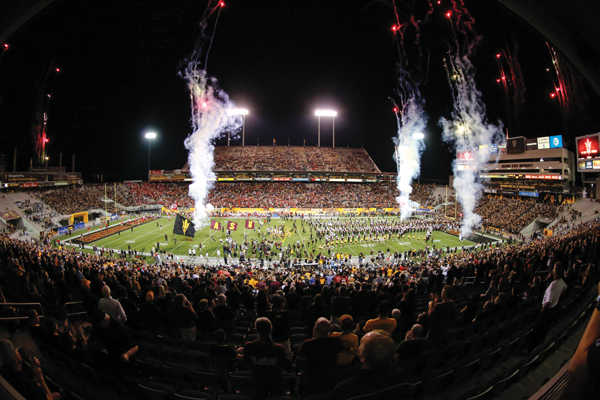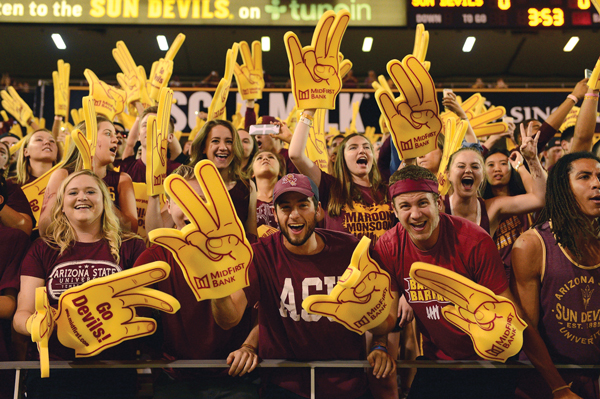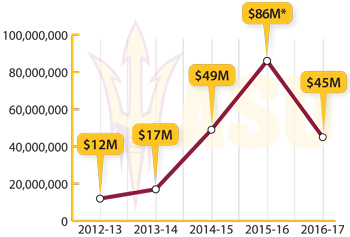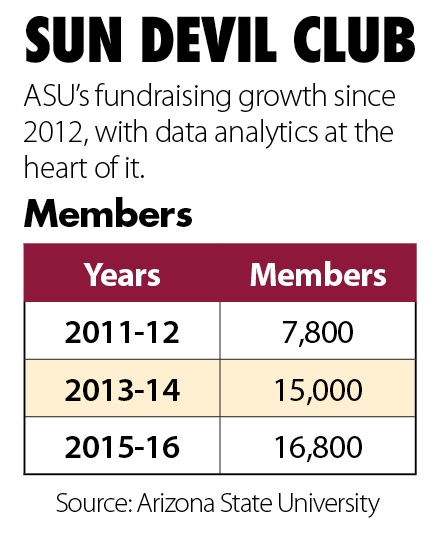Before Rocky Harris worked in Arizona State’s athletic department, he was an alumnus and donor, so he remembers what it was like to be bombarded with communications from the school.
“I got a letter from the alumni association, an email from the Sun Devil Club and a call from the foundation, all in one week,” Harris said. “It gave the impression that there was no coordination in how the school communicated. It looked disorganized.”
Harris, now the chief operating officer for ASU athletics, has played an integral role in changing the way the Sun Devils do business with their most important constituents since he returned to his alma mater in 2012.
Using data analytics that compile information from all over campus, Arizona State has learned to communicate with its donors and ticket buyers through much more targeted emails and phone calls. That’s led to sharp increases in membership and fundraising for the school’s booster group.
Arizona State certainly had room to grow. The school with the largest enrollment in the country — more than 80,000 students — was in the bottom half of the Pac-12 in annual budget and donations five years ago, which was when ASU began working with a third party, SSB, to overhaul its system for collecting and analyzing data.
Now, practically every school in the power five looks at how it can build a data warehouse to store and analyze information about its fans, making analytics one of the hottest topics in the business of college athletics. It informs schools on how to create revenue-generating ticket packages, who to solicit for gifts and when to engage fans during a game.
 |
Arizona State, with the largest enrollment in the country, was in the bottom half of the Pac-12 in donations when it began working with data firm SSB.
Photo by: GETTY IMAGES
|
Arizona State was among a handful of schools ahead of the curve when it began working with SSB to create a data-driven system, and it has remained a priority under Ray Anderson, who is in his third year as the Sun Devils’ athletic director.
With five years of analytics under its belt, Arizona State can more thoroughly evaluate how its program is working.
Membership in the Sun Devil Club has more than doubled during that time, jumping from 7,800 in 2012 to 16,800 this year.
Fundraising has increased along with it. The Sun Devil Club raised just $12 million during the 2012-13 academic year, a pretty pedestrian figure for the school with 400,000 living alumni, half of which live in the Phoenix area. But the booster group will give close to $45 million this academic year, putting it among the top dozen or so in the country, and on a level with Oregon, tops among public schools in the conference.
ASU’s athletic department, meanwhile, has taken an endowment of $3.5 million and turned it into $30 million, giving the school a rainy-day reserve it hasn’t had before.
“Because we communicate in a way that is much more targeted and makes sense, it has really increased the trust among our donors that we have our act together,” Harris said. “It’s allowed us to gain a level of credibility
back from our fans.”
Buoyed by the success of Arizona State, the Pac-12 decided to facilitate relationships between all of its schools and SSB. In addition to the Sun Devils, Southern California and Stanford were early adopters and proponents.
By the end of the academic year, six Pac-12 schools will have data warehouses or will be on their way. Data warehouses are places
where schools or businesses store information about their most important stakeholders, like boosters, and then analyze the information collected.
SSB works with its college clients to compile that information from many different sources, so the athletic department will know if they’ve ever bought tickets, donated or bought merchandise, as well as their age, demographics, salary range, where they live and what they majored in.
The other six Pac-12 schools will loop in during the 2017-18 year, meaning all 12 schools are expected to be on board by June 2018.
“You’ve got to understand the needs of the fans before you can serve them,” said Steve Hank, a senior partner at SSB. “When we put together a 360-degree view of the fan, we start to understand what the needs are and communicate with them better.”
Before he went to work at SSB, Hank was a senior administrator at ASU and became a major advocate for the Sun Devils to adopt a data analytics strategy. He developed a belief and understanding of analytics when he worked at Chicago-based Leo Burnett and ran the Reebok account, where the ad agency taught him how to analyze stats and TV ratings.
After leaving ASU and making a brief stop at Texas, Hank joined SSB last year and is helping the data company build its college business, which now stands at 14 schools and two conferences, not to mention several pro teams and leagues.
But SSB is far from the only company in what is becoming a competitive space. Learfield has gone into business with Robert Kraft’s KAGR to start Klear Intel, an analytics service for its college clients. Circle Media also has developed a client base in the college space, while Umbel has had some wins in pro sports. Each says it has its own unique formula for using data to drive business results.
When he was at Arizona State, Hank saw firsthand how real-time analytics could create additional revenue. The Sun Devils were especially hot one football season and an upcoming showdown against Oregon marked the biggest game in Tempe in years. Through ASU’s real-time tracking, which Hank could access on his phone, he saw that 14,000 tickets were left and they were selling fast — 4,000 sold overnight. Sensing that a sellout loomed, ASU increased the ticket price by $10 each on the remaining 10,000 tickets, generating $100,000 in new revenue.
“If we didn’t have the real-time data to make decisions like that, we would have lost out on that revenue,” Hank said.
That anecdote represents a fairly common application these days. Now it’s more about targeting specific messages and deals to the right audience. For example, don’t send an offer to buy a suite to a 23-year-old recent graduate. Don’t send an offer for a $99 four-pack in the upper corner to a highly successful 50-year-old executive.
That’s the kind of thing that would happen before ASU began segmenting its communications — every fan got every offer. Getting the right deal in the hands of the right recipient increases the chance of a sale and makes the school more efficient.

Through its email communication, ASU has developed an alert for donors who are within 10 percent of the next giving level, and what benefits the donor will enjoy by bumping up a level.
By the same token, if a prospective buyer doesn’t open an email with a special offer after a certain period of time and several attempts, ASU will remove the person from that email list.
Having the most accurate and up-to-date fan information helps the Sun Devils segment those messages. Some of that information might have stayed hidden in other parts of campus, but ASU touts its ability, with SSB’s help, to break down silos and pull information from other academic departments, whether it’s a phone number or email address, and match it with a ticket buyer.
Ryan Clemens and Vincent Boragina, a pair of IT specialists on campus, have been working with athletics to compile the data warehouses. If you want to know whether an engineering graduate or a business graduate is more likely to buy season tickets, they know the answer.
 |
Students are part of the Sun Devils’ 10 million-name database.
Photo by: GETTY IMAGES
|
Of SSB’s college clients, ASU is the first to work so thoroughly across campus, and the school now has close to 10 million names in its database from four primary sources: ticketing, the foundation, students and recruitment.
“We’re going to be able to track people from the time they apply to school until they die, and at some point see a full life cycle,” Hank said.
For now, though, Harris would just like to see Sun Devil Club giving maintain its momentum. Donations spiked in 2015 when a $32 million gift to start a new ice hockey program pushed overall giving to $86 million that year. Even the last three years’ pledges at close to $50 million are a bit inflated because of fundraising related to Sun Devil Stadium renovations.
Harris believes ASU will settle in at around $35 million per year, which will still keep the Sun Devils’ faithful among the nation’s most generous donors.
The success in generating additional resources hasn’t yet translated on the field. ASU’s football team stumbled through a 5-7 season, while men’s basketball is mired in the bottom half of the Pac-12 standings again. Harris knows that athletic departments ultimately are judged by how they perform on the field, so for now the Sun Devils work on providing the resources they hope will set the stage for future successes.
“We’ve been able to overcome some problems that were pretty historic and deep,” he said.









